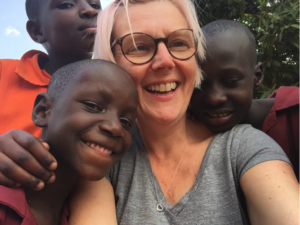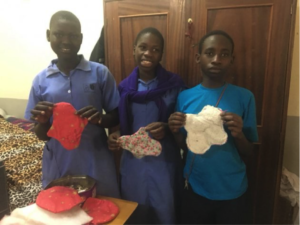Looking at these two photos, we can see that educational contexts differ hugely across continents, but often the struggles and expectations for teachers can be very similar – this can be wearying, hard work. But similarly, the passion for education, for seeing pupils aspire to something greater, is something we all share.
Education is the fastest way out of poverty – That’s the underpinning belief of our organisation – “helping the poorest and keenest” – Doubling up our learning, sharing our knowledge
Smiley kids – who could refuse these treasures? Well, while we are very careful about the links and partnerships we build in Uganda, we are ever cautious of the impact this has on the pupils in the schools we visit. Growing research shows that there can be more harm done than good, particularly in terms of short term, “voluntourism” opportunities. Our trips need to have the most positive impact within a short time, so we visit the schools to give our volunteers an idea of context, but we invite the teachers to come out of the schools and engage in training conferences, in order to share their own ideas and experiences, and thus build networks that will support themselves after we’ve gone and hopefully impact on a greater number of pupils. We liaise with our link schools to find out what their training needs are before we go to deliver the conference – It’s not useful being told that you should be doing differentiated group work when you’re already struggling to fit 180 children into your classroom – so an important aspect of our work is getting alongside the schools, teachers and seniors leaders to walk the journey with them and build relationships.
Our conference model – the potential impact of what we do – During the Summer trip of 2018, we hosted two conferences – one at the School for the Deaf in Ntinda, Kampala and one at Changsha Model Primary in Entebbe. Across the two conferences, sixty different schools were represented with approximately one hundred and twenty delegates – so we look at the ripple effect – based on the numbers on roll we were given during registration, if every person who attended the conference learns just one thing, changes just one thing, we have the potential to impact the educational progress of 23,000 lives.
Of course, our learning works both ways – it’s humbling to see the conditions in which our Ugandan counterparts work, with very little infrastructure in terms of technological advancement, to see the creativity with which they work, with minimal resources and to be inspired by the pride they take is a privilege in itself.
This year, we had two focus areas:
Shoes – in order to access education the children need to get to school – walk a mile in their shoes – but many of them don’t have shoes, and if they do, they look like the dog already had them for lunch!
One initiative is that we collect shoes from one of our schools in the UK at the end of the summer term and take them to our hub schools where we also have a small number of pupils whose places are sponsored.
Sanitary towels – girls education has always been a high priority for Doubleme, not only accessing education, but staying in education. Many don’t have and can’t afford appropriate sanitary materials and so stay at home, sometimes missing up to a week of every month of their education – when here in the UK we tell parents, “if your child is 10 minutes late every day, that’s 50 minutes of learning they miss every week, 30 hours each academic year,” imagine what the prospect of missing 5 days every month begins to add up to. Previously we have linked with a company making biodegradable products, but for many, the cost of these was still unsustainable.
This year we went down the washable re-usable route. We linked with one company, Afripads, making such products, who came and inspired us all at our conferences. But what about the girls who still have no funds to purchase these? Then we looked at making our own – we took samples and patterns out to the School for the Deaf in February and left them to explore ideas of what could be used. The girls were taught how to make their own pads using bed sheets, t-shirts and old towels – even umbrella covers for added waterproofing! When we returned in July, staff from the School for the Deaf were able to share their experiences and inspire others to try for themselves, opening up opportunities for schools to explore attendance, community links with local seamstresses etc and even small enterprise models.
With a trip planned for February 2019 to lay ground work for next year’s conferences, who knows what exciting opportunities lay in store for Summer 2019?
Why not join us and find out?
Ruth Everingham – Team Leader and Trustee









